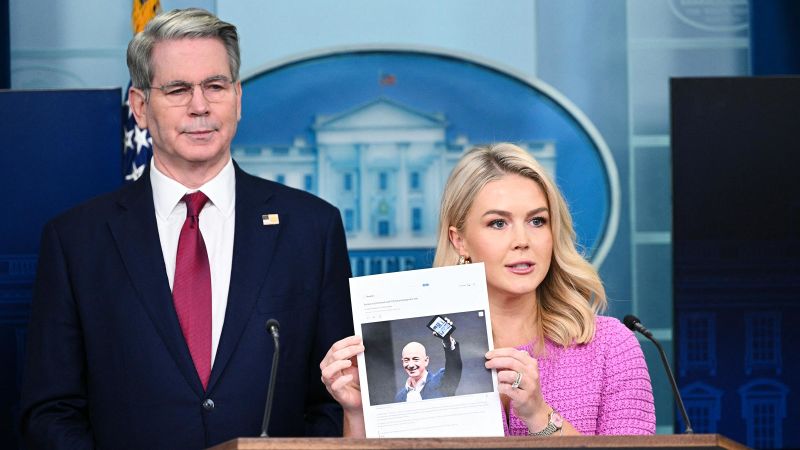The recent developments surrounding Amazon’s consideration of displaying President Donald Trump’s tariff-related costs have escalated tensions between the White House and the e-commerce giant, sparking discussions around trade policies, consumer awareness, and the broader implications for U.S. businesses. On a notable Tuesday briefing, White House Press Secretary Karoline Leavitt made headlines when she labeled Amazon’s potential decision as a “hostile and political act.” Leavitt stated she had discussed the matter with Trump earlier, indicating the administration’s keen interest in the dynamics of this situation.
According to reports from Punchbowl News, the plan to display tariff costs alongside product prices could significantly illustrate to consumers how Trump’s tariffs are influencing the total cost of goods. Notably, these tariffs include a staggering 145% on imports from China and a 10% minimum tax on imports from other nations, raising questions about their impact on American consumers and retailers alike. Such a move from Amazon could provide transparency regarding the additional costs incurred by consumers as a direct result of government tariffs.
However, Amazon has since responded, clarifying that the idea of disclosing these costs was never intended for its main platform, nor has any implementation taken place across Amazon properties. A spokesperson asserted that while there was contemplation around listing import charges for certain products on Haul—Amazon’s spinoff that focuses on selling less expensive items—the change has not been deployed. This statement was quick to assert that “this was never approved and is not going to happen,” effectively distancing the company from the ongoing political narrative.
In contrast to Amazon’s hesitance, other e-commerce platforms, particularly Shein and Temu, have already taken steps to address tariff costs in their pricing strategies. Temu, for instance, has introduced a new import charge displayed prominently at checkout, reflecting the reality of sourcing products from China amidst increasing tariffs. This differential approach raises discussions regarding corporate responsibility, transparency, and the varying tactics companies are implementing in response to government policies.
Interestingly, these discussions come against a backdrop of broader political sentiment. Leavitt referred to a 2021 Reuters report detailing an alleged partnership between Amazon and a “Chinese propaganda arm,” which heightened skepticism about the company’s global operations and motivations. Emphasizing the importance of supporting domestic production, Leavitt encouraged Americans to “buy American,” citing the necessity of “onshoring critical supply chains” to bolster the U.S. economy.
The implications of such disputes raise pertinent questions about the relationship between President Trump and Amazon’s founder, Jeff Bezos. While Trump has expressed positive sentiments about Bezos in recent interviews, painting a picture of cooperation, the current trade policies and Amazon’s potential moves reveal a contrasting narrative of tension. Bezos has previously shown interest in maintaining rapport with the administration, having donated $1 million to Trump’s inaugural fund and producing media content focusing on First Lady Melania Trump. All the while, Bezos’s wealth has taken a hit, reportedly declining by $30 billion this year, a change partially attributed to Trump’s tariff policies that affect Amazon’s operations.
As market reactions unfold, Amazon’s shares dipped about 1% in early trading, a minor reflection of the company’s precarious position in the tumultuous landscape of U.S.-China trade relations. Ultimately, the discussions surrounding tariffs, transparency in pricing, and corporate accountability underscore a pivotal moment in the intersection of commerce and politics in America, with significant implications for consumers, companies, and government relations as the landscape continues to evolve.



